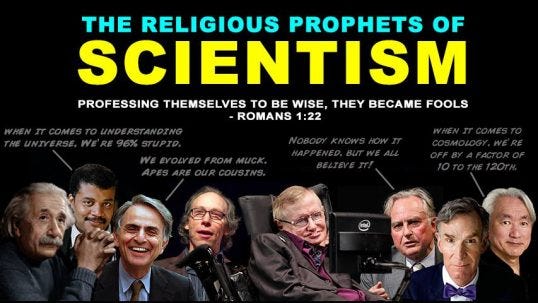A Brief history of $cientism
The 'Enlightenment', 'Rationalism', 'Positivism', 'Science', 'Materialism' are philosophies and religious frameworks. Perfect for the Totalitarian.
Today we are assaulted, bludgeoned, abused and debauched by the all-knowing, all-seeing, omnipotent ‘God’ of ‘Science’, interepreted by the priestly caste of self appointed apostles and little Gods of ‘science’, ‘reason’, and ‘the consensus’. The modern shamans, fakirs and druids. The egocentricitiy and corruption of modern systems of ‘science’ and inquiry is breathtaking. An ineluctable outcome of the ‘Enlightenment’. Corona and Climate totalitarianism is thus not a surprise but simply a logical endpoint to what started in the 17th century.
Early-Modern Scientism
The roots of scientism extend as far back as early 17th century Europe, an era that came to be known as the ‘Scientific Revolution’. Prompted by the collapse of Byzantium (1453), stirred up by the age of discovery, new wealth, new materials, new trade routes and a burgeoning middle and merchant class, society was changed and quickened. A cascade of inventions in the late middle ages, including that of the printing press, changed society and ushered in aspects of modernity. The ancient pagan cults and their philosophies, including Plato and Aristotle had long been challenged but a new emphasis on proof and experimentation came to the fore.
The Musulman empire of the Ottomans forced a massive change in trade routes and new voyages of discovery initiated by the European Christians, ostensibly to acquire commodities and resources in the East. With the incredible achievements from the 15th to 17th centuries, there was now a surfeit of wealth, gold, silver, and trading profits, leading to an investment in money and time to study the ‘natural sciences’ in detail, a subject matter taught in the medieval University system as being mandatory to understand the God-created world.
The ‘scientific method’, long in existence was codified in various ways by the Catholics such as Francis Bacon, Rene Descartes, dozens of Jesuit astronomers, Copernicus, the over-rated Galileo Galilei, and Protestants such as Kepler to name a few. Over time ‘Scientific Societies’ and ‘Academies’, mimicking that of ancient-Athens, sprang up in every European country, funded by the munificence of empire, trade and wealth accretion. The main import and output of these groups and individual men was the rather monumental change in attitudes and culture, namely, to replace annotations and arguments over ancient texts with real-world experimentation.
Yet these men and the related institutions of inquiry, also created the platform for modern $cientism. Descartes and Bacon for example employed strong rhetoric to create a cultish framework for their work, believing in essence that the human could become ‘God’. They claimed that by learning how the physical world worked, we could become “masters and possessors of nature.”1 The God-created world was being remodelled along the lines of a rationalistic-hubristic philosophy, where humans replaced the divine. The philosophical foundation of society and its worldview was altered.
Through application and technical developments, Western civilisation did indeed produce societal innovations. Beneficiaries of mechanisation included transportation, war, trade, agriculture, capital creation and deployment, city and village planning, welfare, health care and the elimination of many diseases through mostly sanitation and improved medical methods (though bleeding and cutting off of limbs can hardly be claimed as ‘scientific’). Yet incorrectly, and even nefariously, these material and application improvements were all attributed to ‘science’, when in fact, it was the material wealth from discovery, trade and commerce, which generated the industrial revolution and the use of machines, or technology, which improved life. Application and technological development may or may not be related to ‘science’. It is related to productivity and profit creation, which flows back into society and various public and social improvements through various channels.
It was the great developments of the late medieval era and the early modern period which set the stage for the self-congratulatory, egocentric philosophy of $cientism. As society changed there arose from the theories of Bacon and Descartes a rather perverted and extreme view of ‘reason and logic’ through the debasement of our other faculties such as social bonds, culture, heritage, creativity, memory, and imagination. As if the ‘sewer’ as an invention sprang out of nothing. The creativity, energy, curiosity, materials, and technological capability to build and deploy sewers are indeed based on mental acuity but a whole host of other attributes which are just as important, including culture.
The ‘rationalists’ and ‘philosophes’ denigrated writing, poetry and emotions to second class status. Religion was tolerated until the French Revolution but afterwards endlessly attacked. Descartes’ rendering of the entire universe as a giant machine left little room for faith, the arts or other forms of human expression.
The Enlightenment
A century later, many of the Enlightenment intellectuals continued their love-affair with the power of natural science. They claimed that not only could science enhance the quality of human life, it could even promote moral improvement. The Encyclopedist Denis Diderot aimed to collect, organize, and preserve all human knowledge so that “our children, becoming better instructed, may become at the same time more virtuous and happy.”2 Many of the French philosophers even claimed that science could be a substitute for religion. In fact, during the French Revolution, numerous Catholic churches were converted into “Temples of Reason” and held quasi-religious services for the worship of science.3
Darwinism, Marxism and other dialectical materialisms, which are religions and philosophies without ‘scientific’ merit, simply picked up where the ‘philosophes’ and the French Revolution had stopped. One could argue that the rhetoric and religious-treatises of these revolutionaries opened up some avenues of intellectual inquiry. But it can equally and more emphatically be argued and proven that these priests and apostles of their own limited ‘reason’, debauched real reason, the past, faith, traditions, the world of the 5 senses, history and culture. Reality in all its complexity replaced by ‘scientific’ dogma which in itself has become a Church. An example is the quack Saint Jenner of the vaccinations, a man who murdered his own son with his concoctions but who is venerated as a symbol of ‘science’. He was not a scientist but simply a quack and businessman, who with other rich investors created an industry for profit which did nothing to help human health. Today such a view is met with laughter and ridicule. The cult of $cientism and its deformed piety run deeps.
Positivism
Modern $cientism is heavily predicated not only on the ‘Enlightenment’ but also positivism first developed a corpus of distorted ‘though’ in the 19th century. Its founder was August Comte, who built his positive philosophy from a deep commitment to David Hume’s empiricism and scepticism (note that the empirical sceptics never apply their framework to their own religion of ‘reason’). Comte claimed that the only valid data is acquired through the senses. Nothing was transcendent, and nothing metaphysical could have any claim to validity.4 The task of scientists was twofold—first, to demonstrate how all phenomena, including human behaviour, are subject to invariable natural laws.5 Second, they would reduce these natural laws to the smallest possible number, and ultimately unify them under the laws of physics.6
Comte also subsumed all of human intellectual history into a single process which he called the Law of Three Stages. In his view, each branch of knowledge passes through three stages: the theological or fictitious, the metaphysical or abstract, and lastly the scientific or positive state. He believed that through the continual advancement of human understanding, religion would fade away, philosophy and the humanities would be transformed into a naturalistic basis, and all human knowledge would eventually become a product of science. Any ideas outside that realm would be pure fantasy or superstition.
Logical Positivism
Comte’s ideas were extended during the 20th century promoted by ‘The Vienna Circle’, and others who attempted to reinvigorate the fundamental tenets of positivism with enhanced symbolic logic and semantic theory. They called their approach, logical positivism. In this system, there are only two kinds of meaningful statements: analytic statements (including logic and mathematics), and empirical statements, subject to experimental verification. Anything outside of this framework is an empty concept.7
The absurdity of positivism is quite self-evident. What is the ‘right observation’? What is the ‘right experiment’? Why is there only one interpretation of an experiment or outcome? How is anything really ‘proven’? The atheist Karl Popper pointed out that few statements in science can be completely verified. He rightly stated that a single observation has the potential to invalidate a hypothesis, and even an entire theory. Therefore, he proposed that instead of experimental verification, the principle of falsifiability should demarcate what qualified as science, and by extension, what can qualify as knowledge.8
The positivist position relies on a complete distinction between theory and observation. Back in the real world, this is hardly the case. W.O. Quine pointed out in his “Two Dogmas of Empiricism” that observations themselves are partly shaped by theory, world views, expected conclusions, biases and philosophical dispositions (“theory-laden”).9
What counts as an observation, how to construct an experiment, and what data you think your instruments are collecting—all require an interpretive theoretical framework. If you believe in the millions-billions-trillions of years of ‘evolution’ you will interpret a rock outcrop in a certain way and design tools and methodologies to support your view. This is not ‘science’ but justification. The examples with climate, Corona, cosmology, psychology, evolution and any field in which maths, measurement, or technical data analysis is present, are wide open to fraud, manipulation and mendacity.
$cientism
Obey the $cience and our Scientism, the elite, the corrupt, the demonic, the twisted, all scream. Obey or be destroyed. There is huge money and unlimited power with the religion of ‘The $cience’. Follow the money to the ‘$cience’. $cientism is a despotic theology, one built to control and profit, not to enlighten or help.
Philosophically it is clear that the very hypocrisy and absurdity of this religion’s own anti-science position, is lost on the true believers in the cult of $cientism. Their own ineluctable variants of totalitarianism are equated in their demented and fermented minds as ‘democratic’, ‘pure’, ‘noble’, ‘moral’ and of course ‘scientific’. The opposite is true. $cientism is the cult of the despotic and the elixir of the sheep and enslaved.
Simply put, $cientism, ‘positivism’, ‘rationalism’, are in the main philosophical approaches to justify a world-view, and a set of objectives and goals around that world-view.
Notes and references
1-Descartes, Rene. Discourse on Method.
2-Sorell, p176 in Sorell, Tom. Scientism: Philosophy and the Infatuation with Science. New York: Routledge, 1991
3-Sorell, p35.
4-Ozouf, Mona. Festivals and the French Revolution. Harvard University Press, 1988.
5-Zammito, John H. A Nice Derangement of Epistemes : Post-Positivism in the Study of Science from Quine to Latour. Chicago: University of Chicago Press, 2004.
6-This view is a form of strict determinism, and current popularizers of continue to enthusiastically endorse it. Perhaps they are “determined” to do so?
7-Zammito, p8.
8-Popper, Karl. Logic of Scientific Discovery. 1959.
9-or an extended discussion, read Zammito’s chapter “The Perils of Semantic Ascent: Quine and Post-positivism in the Philosophy of Science” in A Nice Derangement of Epistemes. University of Chicago Press, 2004.




